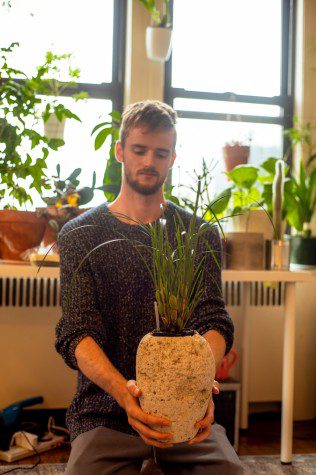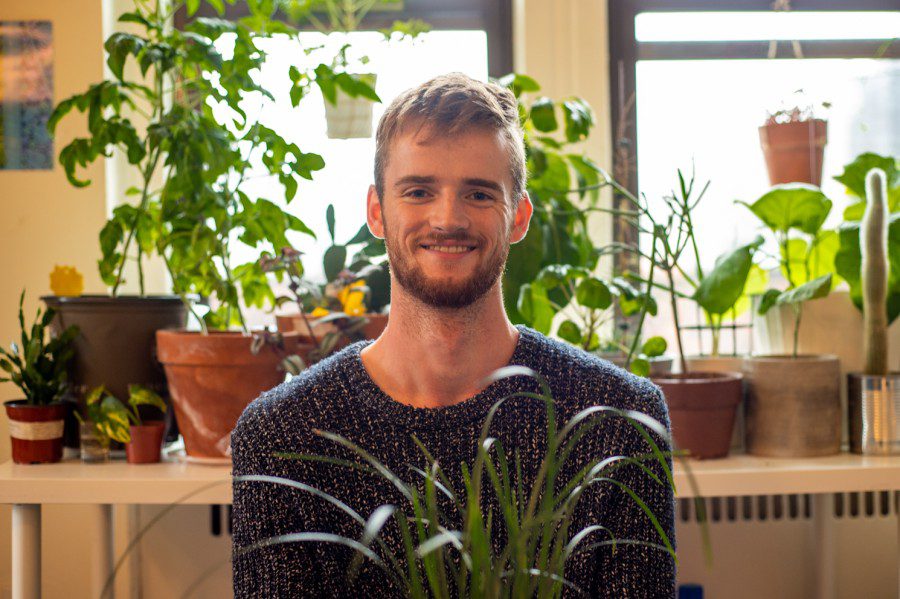NYU plant fanatics and the roses, buds and thorns of indoor gardening
Two avid plant lovers discuss why they own plants and how they take care of them while living in the urban jungle.
Sebastian Goodwin-Groen showcases his large collection of plants in his Washington Heights apartment. (Manasa Gudavalli for WSN)
October 5, 2022
People who don’t own plants are all alike, but the same can’t be said for every plant lover. Even New York City is abundant with plant owners, who each have their own tips on indoor gardening. Owning plants in the city might seem daunting, but CAS senior Seb Goodwin-Groen and Tisch senior Kaysha Pressley offered their tips on indoor gardening and showed that, like Kermit and his green thumb, it’s pretty “easy being green.”
Goodwin-Groen is used to being around plants — especially edible ones. His plant journey started in his childhood, when his family grew a small crop of homemade vegetables in their yard. In his apartment, he now cultivates his own tomatoes, eggplants, beans and mint. He dreams of adding dragon fruit to the list as well.
While it can be convenient to keep your vegetable plants on the kitchen windowsill, Goodwin-Groen warned that these plants might be the most fussy of them all.
“The problem with edible things is that they just need to be wet all the time and New York is a very warm city,” Goodwin-Groen said. “I had 10 different mint plants over the last year and none of them survived.”
Through trial and error, Goodwin-Groen was able to determine how to best keep his plants alive. His biggest piece of advice? Keep an eye on your plants’ soil.
“The way that your soil dries out is so important,” he said. “Most of the people who I see starting to try gardening don’t know why their plants are dying and the reason is always because the soil is wet, unless you did something really strange. When plants start to look unhealthy and you cannot see any bugs on [them], it’s because the roots are rotting. I’ve probably killed at least 25 plants this way. So you should have at least two things: normal potting soil and then something like mosses, something more loose or light.”

On the other hand, Pressley’s interest in gardening developed during the pandemic, proving itself as a perfect indoor hobby — one that led her to work at The Sill. Over the past few years, one of the things she’s come to appreciate most about plants is their ability to ventilate stuffy rooms.
“I like plants because it feels like my air is filtered when I come into my room,” Pressley said. “One of the best plants that filters air the most definitely would be the snake plant because it photosynthesizes in the dark.”
The utility of plants is not their only attractive aspect. Their aesthetic influence on a room can be powerful, and both Goodwin-Groen and Pressley’s rooms have been dominated by the color green. Goodwin-Groen also suggested that plants have value beyond that of normal house decorations.
“The growing thing is fun for me. I don’t buy plants that I don’t think are going to visibly grow,” Goodwin-Groen said. “I like to smell them, see them grow and eat them, and those are the things that you could never do to a painting. So they are not just art; they are doing things for you.”
Aside from aesthetic value, house plants also make for the most empathetic of roommates.
“During one of my serious breakups, a lot of my plants died,” Pressley said. “Sometimes I feel like they understand me. So when I’m in a rut, they’re in a rut too.”
While both of them agreed that New York City’s climate isn’t the most ideal for a wide variety of plants, neither Goodwin-Groen nor Pressley consider this an obstacle.
“There are options for everyone. As long as you have a window you’re fine,” Pressley said. “And if your apartment doesn’t have that much light, your two options would be a snake plant or zz plant — Zanzibar [Gem] — as they can do well in a very low light. These are also very beginner friendly in general, no matter the light situation.”
For Goodwin-Groen, being able to grow plants in the city is just a matter of making time.
“If you can brush your teeth every day, then you also can water your plant, or just look at it while brushing your teeth,” Goodwin-Groen said. “You have daily things that you do and they don’t take very long. It takes me barely half an hour a day to take care of 73 plants.”
Some may say that you need to keep your enemies close, but in the case of plants, you should keep them as far away from your flora as possible. Both Goodwin-Groen and Pressley said that the pest issue is the ultimate test for any plant lover.
“Fungus nuts are like fruit flies, but they aren’t really attracted to your fruit — they are more so attracted to the soil,” Pressley said. “The fungus nuts will lay their eggs in there and then they’ll hatch; they don’t really have a long lifespan — one or two weeks — but they’re annoying as hell because once they start getting in your soil and reproducing, it’s just a mess and then you have them everywhere. That is why, whenever you are buying plants either from Trader Joe’s or Whole Foods, you really should inspect them in the store before you bring them into your home. You can actually sometimes see the fungus nuts’ babies crawling in the soil.”
While Pressley shared both how to look out for bugs and how to deal with them — her tip is insecticides and neem oil mixed with dish soap and water — Goodwin-Groen came to the defense of some of the little critters.
“The other fun thing is springtails, little arthropods,” Goodwin-Groen said. “If you keep your soil moist you can put some springtails — they’ll eat up the fungus and dead parts of the plant. There are also people who get ladybugs because they eat other bugs, but I have so many plants that they come by themselves.”
If you want to develop your green thumb at NYU, you may be in luck. Certain residence halls are giving out free plants, and you can always find a Devil’s ivy, anthurium or succulent at the Union Square Farmer’s Market or your local Trader Joe’s. As the weather gets cooler, indoor plants might be what you need to survive the urban jungle.
“It’s just nicer when there is a little green patch in the room,” Goodwin-Groen said. “I see plants as a daily source of a little bit of happiness.”
Contact Polina Belova at [email protected]
























































































































































